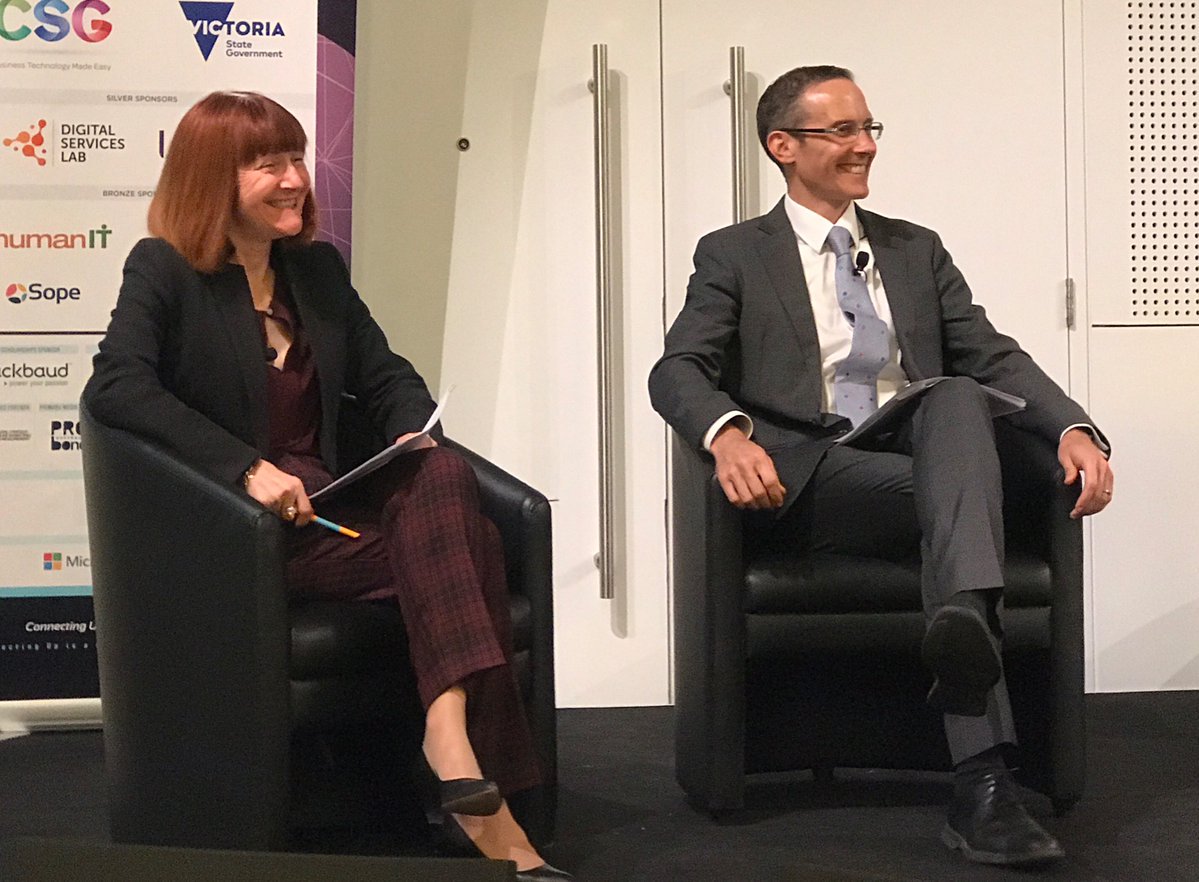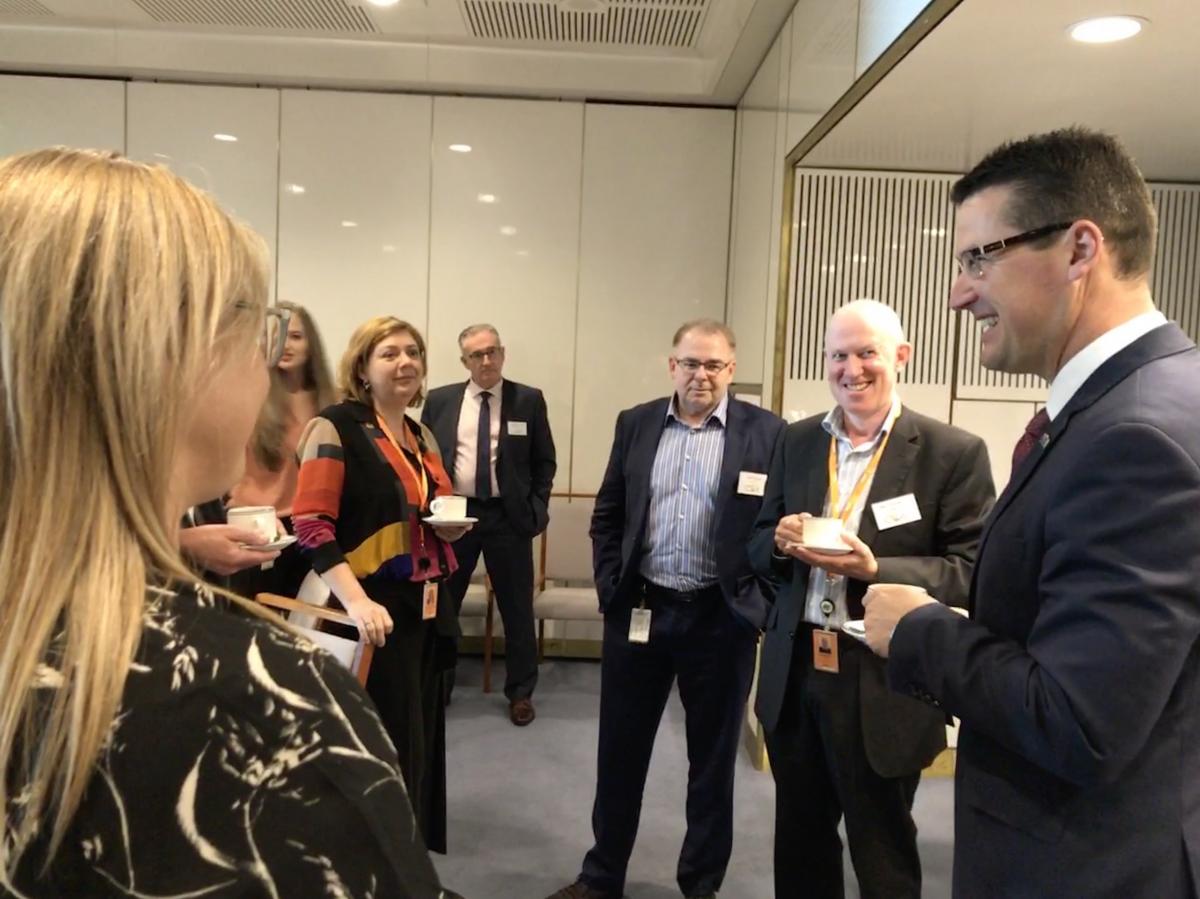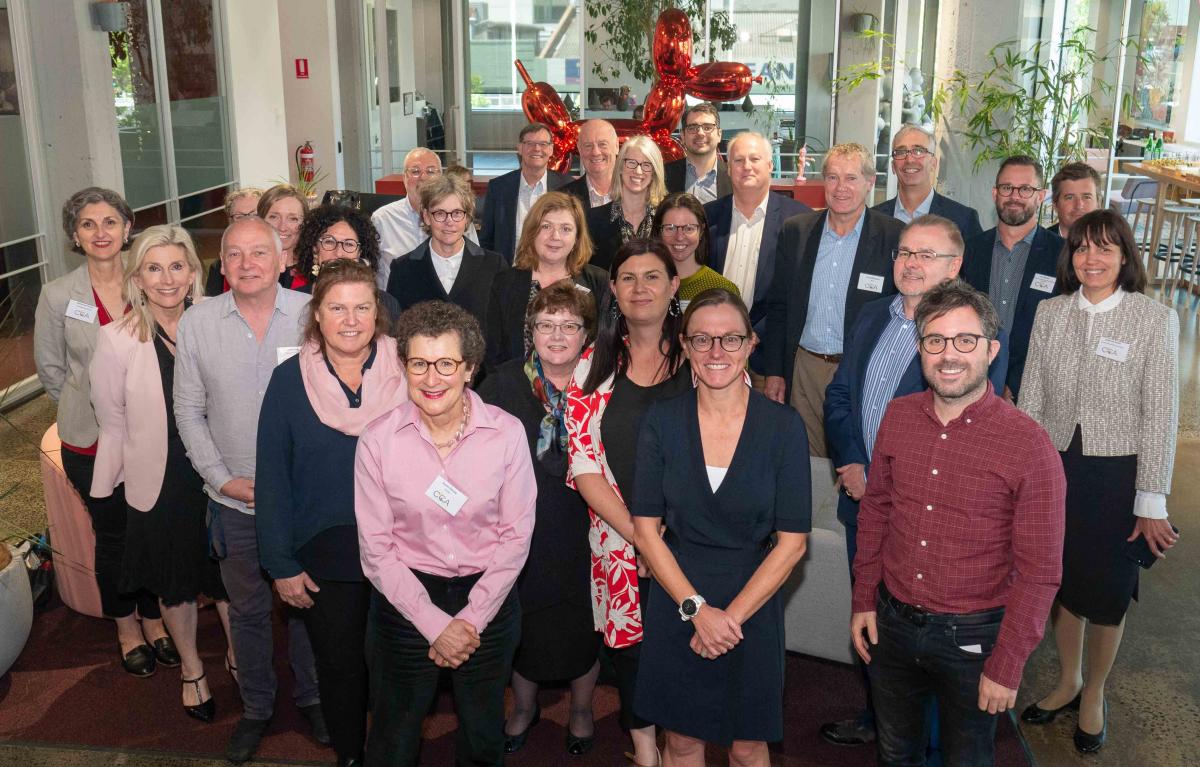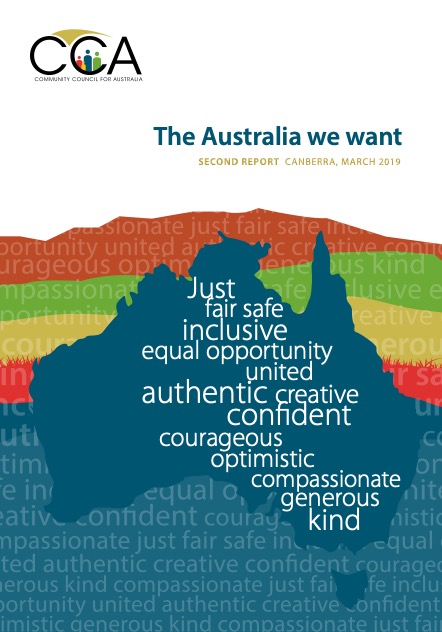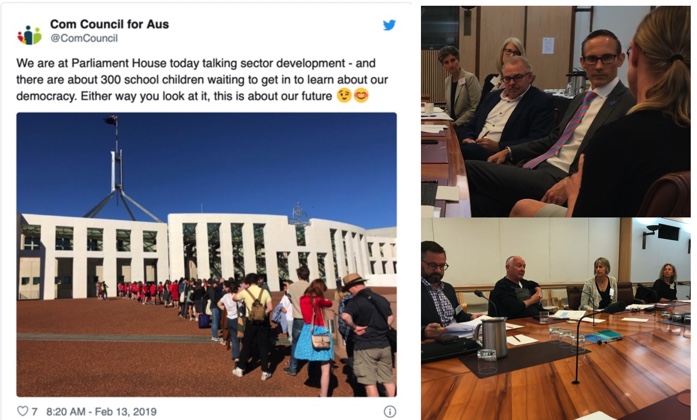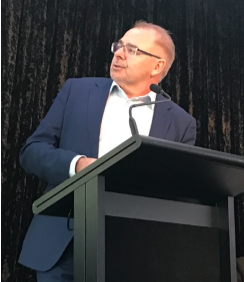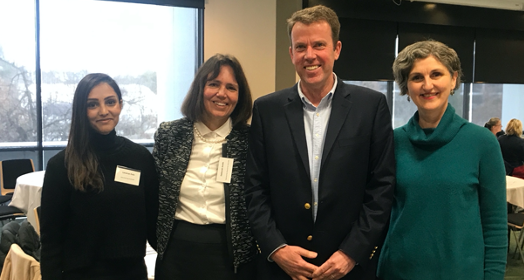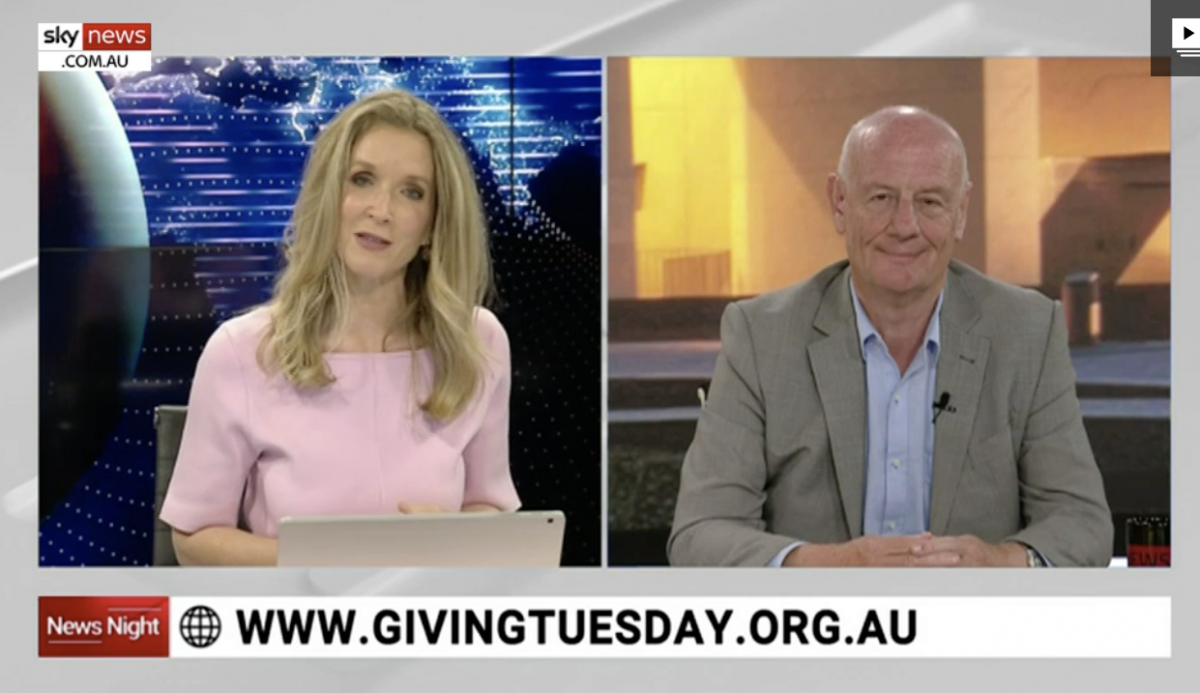Annual Report 2019
Chair Report
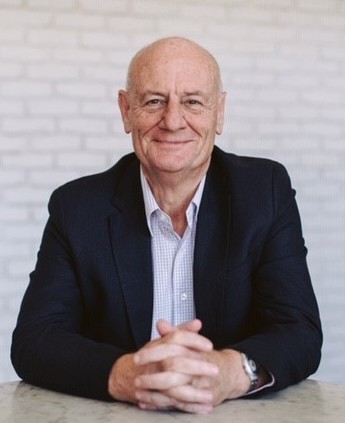
As I write this report, 2019 seems so long ago, like another time.
I think we all now see the past through different eyes since the COVID-19 pandemic changed so much of what we take for granted.
One of the things that seems even clearer now than before is the value of an effective peak body representing the interests of charities, in all their diversity.
While today may not be the time to reflect on more recent work by CCA, the gains made for our sector as part of collaborative campaigns to address the new and pressing challenges of COVID-19 speak for themselves.
The work of CCA over the past decade has built credibility and capacity, both of which have proved crucial over the past few months.
Within this report of our activities in 2019, there are many examples of CCA doing good work, often at the intersection between national policy and national values. I want to highlight just one example of this approach; the research and publication of the Australia We Want report. This is a report grounded in the views of the sector about what values matter, drawing on sector research capacity with the collaboration of the Centre for Social Impact, and providing a solid information platform for launching a broad values-based change agenda. The Australia We Want report encapsulates so much of what CCA exists for. It was well executed, with minimal resources, and attracted significant media and political attention, helping to shift the debate about what is important in Australian communities.
There are many other examples of our shared commitment to change and the hard work that goes into driving our agenda forward. This work is not without its demands and challenges, but in my role as Chair of CCA I am very fortunate to be able to work with some wonderful people who strongly share our commitment to building flourishing communities by enhancing the work of the charities and not-for-profit sector.
I want to acknowledge my fellow Board Directors. They are an outstanding group of sector leaders, each providing invaluable advice and support to CCA. We do not always agree, we have separate perspectives, but the level of respect and positive engagement in our role as CCA Board Directors is quite energising. Unlike some Boards, the focus of a CCA Board Meeting is not so much on monitoring and interrogating various reports as planning and strategy. We have limited resources at CCA, and our biggest challenge is invariably what we choose to do and what we choose not to do.
Most of us already know that our staff are our primary resource and they are exceptional. David Crosbie and Deborah Smith not only do outstanding work, they are clearly driven by the purpose of CCA and the goals we share.
We were also fortunate to have some important supporters in 2019. Karen Mahlab and the Pro Bono Australia team continued to amplify our work, Sean Barrett and the Origin Foundation provided critical funding support as did Claire Robbs and Life Without Barriers. CCA would be greatly diminished without the generous support of these and other partners who helped us along the way.
But as we always acknowledge at CCA, our real strength is our members. Without members we would not exist. Without members, our policy and advocacy would be not much more than opinion.
On behalf of the staff and the Board, I want to thank every CCA member for helping us make a difference.
We are now entering unchartered waters and we will need you more than ever before as we face the challenges of a COVID-19 impacted world.
Thank you for all your support and I look forward to working with you as we strive to better serve our communities and build the kind of Australia we want to live in.
Rev Tim Costello AO
Chair, Community Council for Australia
CEO Report
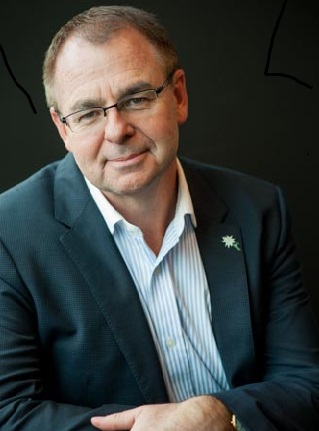
2019 was another busy year for CCA. There were some big projects, a Federal election, writing and publishing the Australia We Want report, and running the national awareness campaign - ItTakesAVillage.
That was all before the COVID-19 pandemic which seems to have taken the workload of CCA to a different level. There is now a level of engagement and collaboration with CCA that we have not experienced previously. This broader engagement reflects the consistent approach CCA has taken in supporting many initiatives to advance charities and their impact on our communities.
In this report I want to focus not so much on our work and achievements in 2019, which are set out in the annual report, but on what makes us effective. I want to talk about the people involved and the values we enact.
Ten years ago one of the deciding factors in my decision to accept this role was that I would get to work with people I respected, people I knew were informed by much more than ambition for themselves or ambition for their organisations.
This is what made CCA special then and what makes CCA special now. There is no pegging out of territories at CCA, no-one seeking public credit or acknowledgement for their work, no simmering tensions. We do not always agree, but we are all trying to achieve the same values-based vision of the kind of Australia we all want to live and work in.
This approach is what I think makes CCA more effective than many would think possible given how small the organisation is and how big our agenda.
As a Chair, Tim Costello is a champion for values and changing our community for the better. And he is not alone. All our Board are not only experienced change makers, they are also motivated by the same vision of a better Australia. It is this shared commitment to make a difference that is so often talked about within organisations, but not always demonstrated. I cannot remember a single discussion about what needs to be done, where CCA should be focusing its efforts, or what policies we should be advocating that was not grounded in the touchstone of creating stronger communities.
Working with Tim and the CCA Board has been one of the most rewarding aspects of my career in the charities sector.
I am also fortunate at CCA to have alongside me as a staff member someone who not only effectively manages CCA, but also effectively manages me, in Deborah Smith. Deb is an inspiration to many of us in her tireless efforts in support of CCA.
Every day in my work, I get to talk to leaders from across the charities sector. I am always learning more about how we need to do better, how we can leverage our work to make change sustainable.
I often say to people that CCA members are self-selecting leaders, mainly because they are informed by the same shared vision of a better Australia. Being a member of CCA is not transactional, it is not about what members get from being a member, it is about being part of something bigger than any individual or any individual organisation.
CCA is going from strength to strength, even though we will have made a financial loss of $60,000 in 2019. This loss is mainly because we carried forward $100,000 of unspent funds from our Origin Foundation funding grant in 2018 which was spent in 2019 to support the ItTakesAVillage campaign. The actual loss in 2019 is less than the carried over funds, so we remain in a positive position with over $100,000 in the bank, a significant improvement on most of our past years.
This relatively strong position reflects the support of our partners, especially the Origin Foundation and Life Without Barriers who provided funding to support our work on impact investing and the new Charites Blueprint project. It also reflects a willingness of our members to support us in real terms through their contributions.
I want to thank all our members and supporters for their support of CCA in 2019.
I know we are going to be facing some big challenges in 2020 and beyond. We still have a huge amount of work to do, a Blueprint for the future of the sector to develop, and a lot of advocacy to ensure as many charities as possible survive and thrive post the immediate impacts of COVID-19.
I am confident that with the people we have involved at CCA, the values that underpin the way we work, and the ongoing support and active engagement of our members, CCA will continue to be an effective peak body representing the charities sector and the communities we all serve.
I look forward to working with you over the coming 12 months and beyond.
David Crosbie
CEO, Community Council for Australia
Policy and Advocacy
CCA was founded ten years ago by leaders in our sector to build flourishing communities by enhancing the extraordinary work of Australia’s charities and not for profit sector. Together, we seek a policy and regulatory environment that works for community organisations - not against them.
Thank you to our members and our partners for your involvement, contributions and support of our work throughout 2019. It could not have been undertaken without you.
|
If Australia is to be a just and fair society where we increase collective ownership of local issues and build flourishing communities, there needs to be a genuine commitment to supporting reforms across the charities and not-for-profit sector (NFPs) from government and other key stakeholders. This is not about providing more funding to the sector, but about encouraging and supporting more effective and efficient organisations delivering better outcomes for our communities. |
The Budget – the most important document a Government produces
CCA’s Pre-Budget Submission to the 2019-20 Federal Budget recommended nine measures to improve productivity; boost philanthropy and workplace giving; grow access to capital and impact investing; reform DGR; and review the generous tax concessions given to mutual organisations on gaming, catering, entertainment and hospitality income.
Commenting on the 2019-20 Budget: CEO David Crosbie told Pro Bono News the 2019-20 Budget was missing “real leadership” on critical issues. This is a budget promising a steady as you go set of services, less taxes and a small surplus in the future, but it fails to offer a compelling narrative about the kind of Australia we want to live in.
This was contrasted with a look across the ditch at an alternative approach, a wellbeing Budget. How good is New Zealand’s budget?, Pro Bono News, 6 June. New Zealand has shown how government can shift from previous budget practices to focus more on measures that reflect the reality of people’s lives.
|
The charities and NFP sector is too important to be left languishing on the sidelines of major economic and social policy change in Australia. An incoming government that is committed to achieving a stronger, more resilient and productive Australia, will start by bringing charities back into national policy discussions, and provide more certainty about their future.
Shadow Minister for Charities and Not-for-profits, Dr Andrew Leigh MP and Greens spokesperson, Senator Rachel Siewert join charity leaders at a pre-Election forum on charity issues held in conjunction with the Connecting Up Transform conference in Melbourne. (The Coalition were unable to send a representative) Our thanks to our partners, Connecting Up and Pro Bono News.
|
Putting Charities on the Election agenda
Our job in the lead up to the 2019 Election was to put charity issues onto the Election agenda. Thank you to the many members and partners that supported this push participating in policy announcements, a pre-election charities policy forum and in discussions with our political leaders and the media.
An Election Platform valuing charities
CCA told all sides of politics that what Australia’s charities need most from an incoming Government is:
· Increased certainty, and
· Support in adjusting to rapid change.
Our election platform called for five reform measures to fundamentally shift the relationship between government and charities to benefit the Australian community.
1. Appoint a minister responsible for the charities sector and a Ministerial Advisory Group of sector leaders to provide advice about much needed reforms in the way governments interact with charities across Australia.
2. Boost sector investment and productivity by increasing certainty in government funding, concessions, incentives and regulations. Measures would include:
· an agreed notice period of six months prior to the ending of any major government contract, incentive or concession;
· increasing the time period of government contracts – where possible to at least five years;
· more transparent and accessible processes for reviewing the performance of NFPs; and
· more transparent and accountable processes for government funding decisions relating to NFPs.
3. Work with the charities and NFP sector to develop a future blueprint for the sector including extensive consultation; economic modeling of future scenarios; strategies to capitalise on emerging opportunities; and increased capacity to respond to emerging risks and limitations.
4. Fix fundraising regulation by providing charities with one nationally-consistent, modern and fit-for-purpose fundraising regime as outlined time and again by the #fixfundraising coalition.
5. Reform the Deductible Gift Recipient (DGR) status processes by simplifying the process and supporting giving by providing Deductible Gift Recipient (DGR) status to all registered charities.
The Labor party responded with a suite of policy commitments (Labor gives charities the spotlight in final days of election campaign, Pro Bono News, 8 May 2019). CCA and other sector leaders welcomed the focus on charities in the final race to the election: ‘We’re used to politicians talking about what business needs, but charities are rarely given a second thought, despite all the reform needed to ensure we have a strong charities sector moving forward.
As the Morrison Government returned to government, CCA welcomed the commitment to reform fundraising regulations and hoped the Prime Minister would appoint a charities minister in the new cabinet to ensure all charities and NFPs have a clear avenue for productive engagement with the government. (Morrison vows to prioritise NDIS following election win, Pro Bono News, 20 May 2019).
|
Senator the Hon Zed Seselja talks informally with CCA Board Members at Parliament House shortly after being appointed Assistant Minister for Finance, Charities and Electoral Matters. 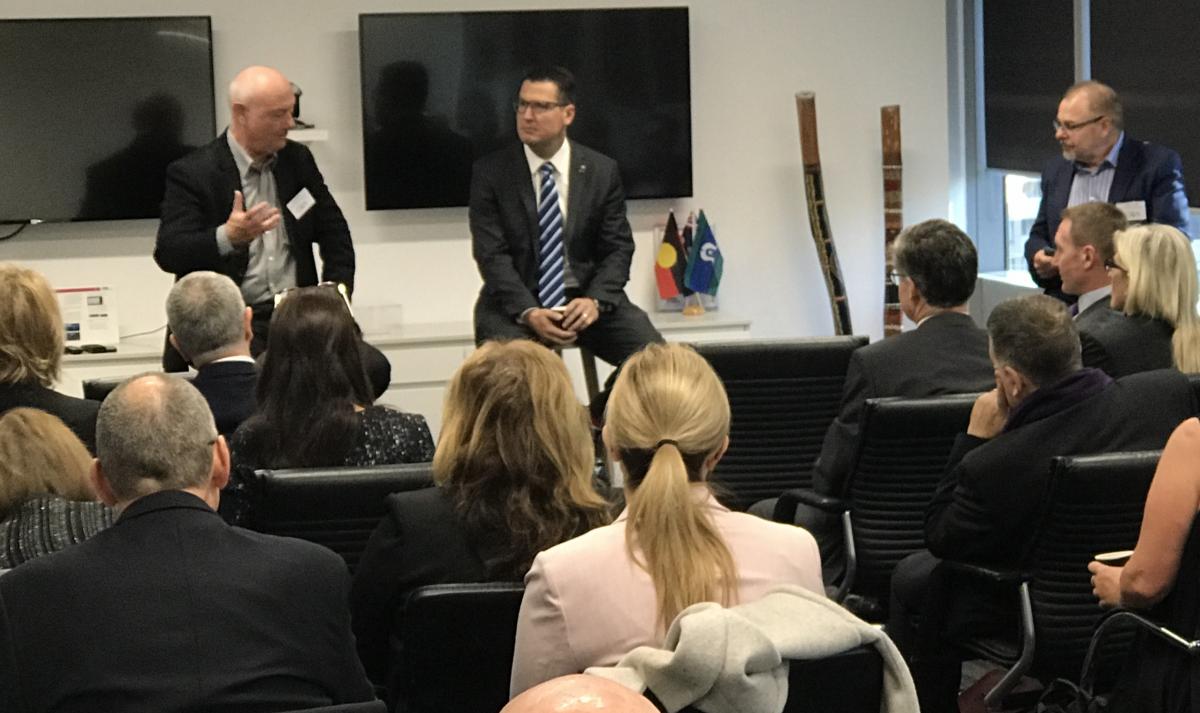
30 leaders from the CCA network join Chair, Tim Costello and CEO David Crosbie in conversation with Senator the Hon Zed Seselja, Assistant Minister for Finance, Charities and Electoral Matters in Sydney. Our thanks to James Toomey, David Pigott and Mission Australia for hosting. |
Australia's first charities Minister
CCA, a longtime advocate for a Minister for Charities, welcomed the appointment of Australia’s first charities minister, Assistant Minister for Finance, Charities and Electoral Matters, Senator the Hon Zed Seselja.
The Minister met informally with the CCA Board in the week of his appointment and has engaged positively with CCA and members inside and outside of Parliament House.
In Sydney, CCA members talked with the Minister about the link between inclusion and productivity: a more inclusive society is a more productive society. The discussion identified four clear opportunities for the Minister to better enable the work of charities to support their communities and a more resilient, productive and confident Australia:
1.Reduce red tape. The Minister said he is making red tape reduction a priority, focusing initially on the ACNC (including the Government’s response to the ACNC Review), DGR reform and looking at fundraising reform.
2.Build trust and champion the sector’s achievements and contribution. Leaders asked the Minister to drive a more positive discourse that celebrates the achievement and contribution of the charities sector.
3.Value and invest in capability. Leaders want capability valued and supported. ‘Admin costs’ are destructive and of no value as a proxy measure for charity performance. It is well known that high performing businesses invest in their people, their leadership development, their systems and their resources. Why is it different for charities?
4.Change the language. Charities are acutely aware of the human cost of policy discussion that treats people as a ‘burden’ or a ‘problem’, an ‘us’ or a ‘them’. Language and perspective needs to change, and there is a real productivity gain to be realised through valuing individuals and their potential.

